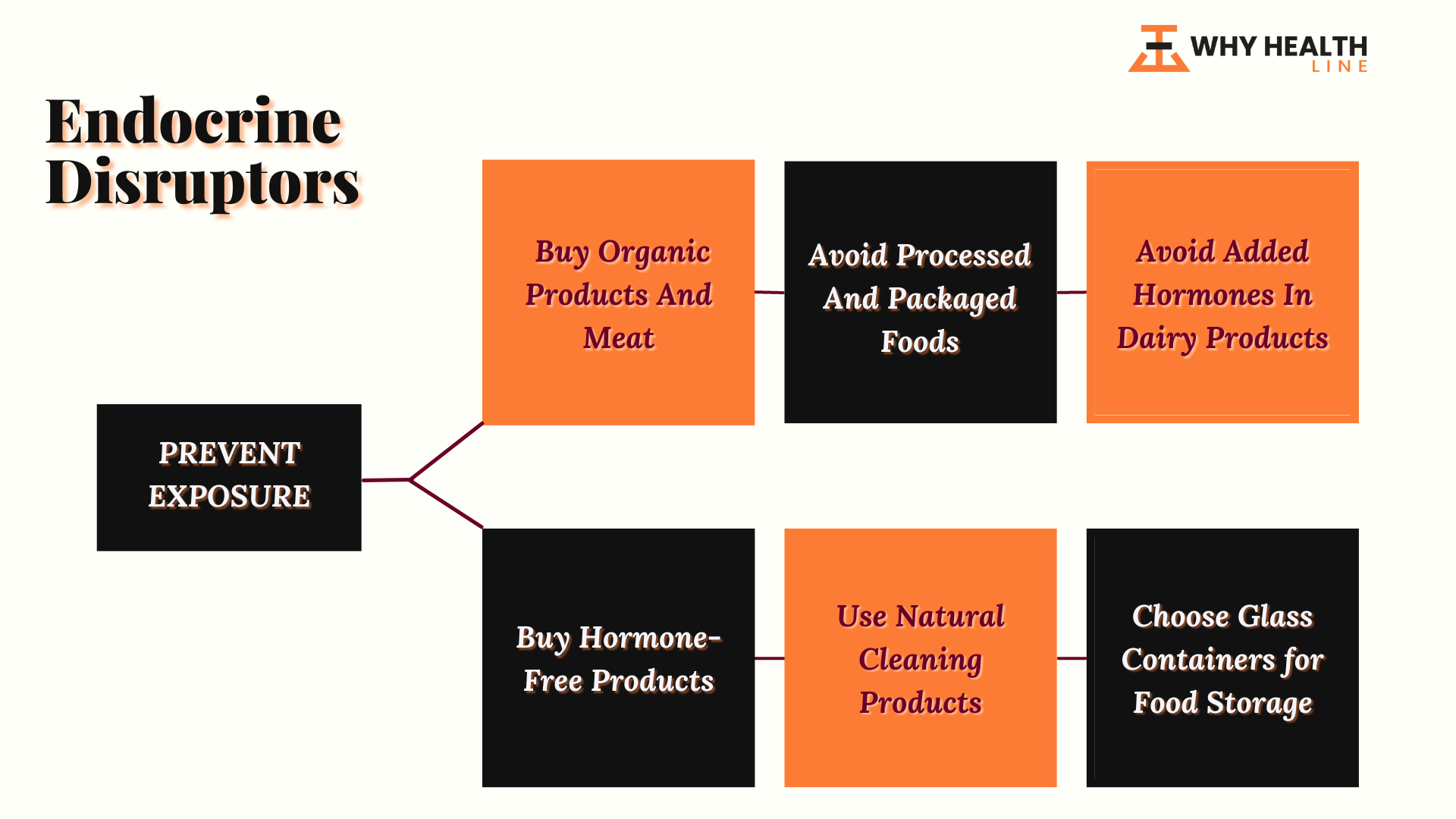
Our endocrine system consists of a network of glands that synthesize and secrete hormones used by our body. Endocrine disruptors are hormonally active agents of natural or human-made chemicals.
They can interfere with endocrine systems and induce various health conditions. They are generally associated with problems in the reproductive, neurological, developmental, and immune systems.
In this article, we will discuss the effects of endocrine disruptors on the human body and how you can prevent them.
Effects of Endocrine Disruption
Endocrine disruptors are agents that can impact the human body in various ways.
These effects usually include:
- Developmental malformations
- Interference with reproduction
- Unintended weight fluctuations
- Sudden changes in cholesterol and blood sugar levels
- Increased cancer risk
- Disturbances in the nervous system function.
If your healthcare provider suspects you are suffering from any of these endocrine issues, he might refer you to an endocrinologist for a thorough examination. The specialist will likely perform specific testing to identify the main issue.
These tests usually include urinalysis, blood testing, fine needle, ultrasound, computerized tomography (CT) scan, or magnetic resonance imaging (MRI) scan.
How Chemicals Can Disrupt the Endocrine System
Chemicals can cause disruption in the endocrine system in multiple ways. Some chemicals act as endogenous hormones and induce the body to over-respond to a certain stimulus or response at inappropriate times.
These chemicals can cause the endocrine system to produce insulin when it is not even needed.
Endocrine disruptors, by causing a hormone imbalance, lead to various disorders. These conditions are usually characterized by a gland producing too much or inadequate amounts of a hormone.
This malfunction and hormonal imbalance typically result in the following problems:
- A genetic disorder
- Infection or disease
- Injury to an endocrine gland
Endocrine disorders can also take place due to the development of tumors in the endocrine system.
Though these lumps are usually not cancerous and do not travel to other body parts, still, they can severely impact the endocrine system’s hormone production.
How May Endocrine Disruptors Enter the Human Body?
Endocrine disruptors are either natural or human-produced disruptors that can enter our body in numerous ways. They interfere with the natural functioning of our endocrine system.
People usually get exposed to endocrine disruptors through the ingestion of certain food items, skin exposure, pesticides applied, and inhalation. Even low doses of endocrine-disrupting agents can prove to be dangerous.
The majority of the endocrine disruptor agents are lipophilic and are accumulated in the adipose tissue. In most cases, the effects of these disruptors are shown gradually and manifest in later life stages.
However, in some people, these hormonally active agents do not induce any apparent changes.
The Impact of Endocrine Disruptors on Health
Endocrine disruptors interfere with normal bodily processes and have been linked to various types of serious health conditions and disorders.
These conditions usually include attention deficit hyperactivity disorder (ADHD), diabetes, cardiovascular diseases, metabolic disorders, Alzheimer’s disease, obesity, or early puberty.
These endocrine-disrupting agents have also been associated with causing infertility, abnormalities, impaired reproductive performances, changes in immunity and behavior, and skeletal deformities.
How Can Endocrine Disruption Be Treated?
The type of treatment usually depends on the severity of the condition induced by these disrupting chemicals.
However, specialists usually recommend any of the following ways to treat endocrine disorders:
- Medication to rebalance hormones and eliminate symptoms
- Chemotherapy or radiation therapy for patients having cancerous tumors
- Surgery to remove a tumor that is affecting hormone production
For most people, these treatments prove to be curative. However, in some cases, they may not result in effective results.
Disadvantages of Endocrine Disruptors
There are several disadvantages of hidden hormones or endocrine disruptors, which are synthetic chemicals used in various products that can mimic the effects of hormones on the body.
Some of these disadvantages include:
- Health risks
- Environmental pollution
- Regulation challenges
The good news is that there are steps we can take to reduce our exposure to these endocrine disruptors.
How Can You Prevent Exposure to Endocrine Disruptors?
Endocrine Disruptors are chemicals that interfere with the normal function of hormones in the body, and they can be found in various products we use every day.
Here are some ways you can prevent exposure to hormone disruptors:
1. Buy Organic Products And Meat
To reduce your exposure to hidden hormones in your diet, one significant step you can take is to buy organic products and meat whenever possible.
Organic products and meats are grown without synthetic hormones and can reduce your risk of ingesting hidden hormones.
Additionally, organic foods are often higher in nutrients and contain fewer pesticides. When shopping for produce and meat, look for the organic label and consider making the switch.
2. Avoid Processed And Packaged Foods
One of the best ways to reduce exposure to hidden hormones is to avoid processed and packaged foods. These have been treated with preservatives, colorings, and other chemicals, some of which contain hormones.
Try to eat fresh, unprocessed foods that you prepare yourself whenever possible. If you buy packaged foods, read the label to ensure you know what is in them.
3. Avoid Added Hormones In Dairy Products
An easy way to reduce your exposure to endocrine disruptors (hidden hormones) is to avoid dairy products from cows treated with hormones.
Many dairy companies inject cows with hormones to increase milk production, and the hormones can remain in the milk.
If you need more clarification, it’s always best to ask the company for more information about its hormone policies.
4. Buy Hormone-Free Products
One of the best ways to reduce exposure to hidden hormones is to buy hormone-free products. Whenever possible, look for products that are explicitly labeled as being hormone-free.
This can be anything from meats and dairy products to personal care products or cosmetics. While hormone-free products may cost a bit more, they are worth the investment since they are not treated with hormones.
5. Use Natural Cleaning Products
Another way to reduce exposure to endocrine disruptors (hidden hormones) is to use natural cleaning products. Many commercial cleaning products contain synthetic hormones, like phthalates, that can increase hormone levels in the body.
Using all-natural cleaning products can avoid the risk of these chemicals leaching into your home. Natural cleaning products are made from natural sources such as essential oils, vinegar, and baking soda and are free of artificial dyes, fragrances, and preservatives.
6. Choose Glass Containers for Food Storage
If you’re trying to reduce your exposure to endocrine disruptors (hidden hormones), one of the most effective things you can do is switch to glass containers for food storage. Many plastics contain chemicals that can leach into food and cause hormone disruption.
Glass, on the other hand, does not have any of these chemicals and is, therefore, a safer choice. Additionally, glass is durable and easy to clean, making it an excellent option for storing food.
Switching to glass containers can reduce your exposure to hidden hormones and keep your food safe.

Conclusion:
In conclusion, reducing exposure to hidden hormones or endocrine disruptors is not always easy to do, but with a few simple steps, you can minimize it and enjoy a healthier lifestyle.
Moreover, it’s essential to speak to a healthcare provider if you suspect you have a hormonal imbalance.
FAQs
How Do I Avoid Endocrine Disruptors?
There are various ways that can help you reduce your exposure to these harmful endocrine disruptors:
- Wash your hands more frequently, specifically before having meals.
- Dust and vacuum often.
- Choose products that do not contain fragrances.
- Minimize the usage of plastics.
- Say no can do to cans.
- Watch what you eat.
- Filter your tap water.
- Rethink before purchasing cosmetic products.
Which Foods Are Endocrine Disruptors?
Various foods contain high levels of endocrine-disrupting chemicals that enter our bodies and cause an imbalance in regular hormone production.
This, as a result, leads to various problems. Therefore, you should limit the intake of such food items.
- Red Meat
- Processed and Refined Foods
- Caffeine
- Soy and Dairy products
Is Milk an Endocrine Disruptor?
Milk and other dairy products can also act as a source of exposure to endocrine-disrupting compounds. Various types of estrogen hormones are found in cow’s milk.
Therefore, you should limit too much consumption of milk and other dairy products to prevent your exposure to these hormonally active compounds.